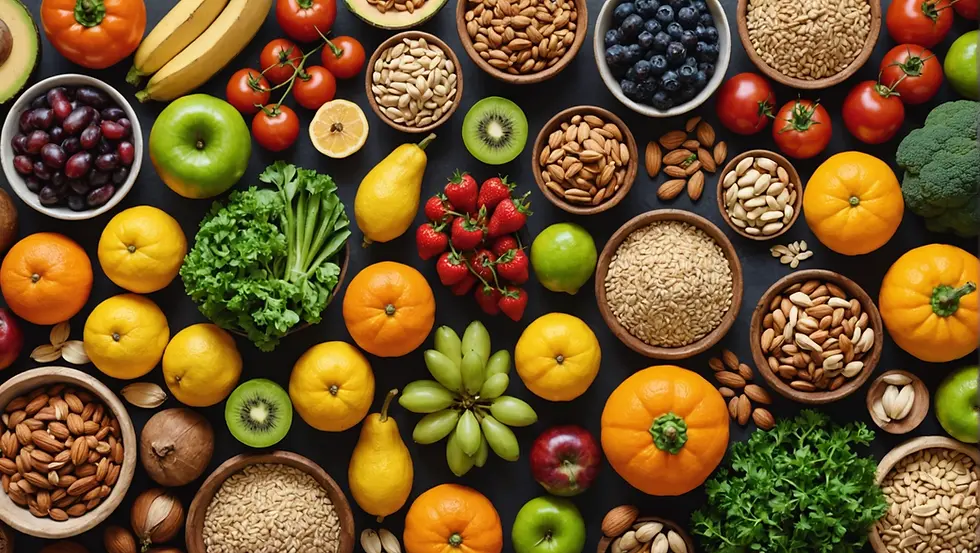Osteoporosis literally means ‘bones with holes’
- Kerry Caudwell: Natures Connection

- Jul 31, 2019
- 4 min read

It occurs when bones lose minerals more quickly than the body can replace them. They become less dense, lose strength and break more easily. Osteoporosis is a systemic skeletal condition that causes bones to become thin, weak and fragile, such that even a minor bump or accident can cause a fracture. While osteoporosis can occur at any age, its most common in older people, particularly post-menopausal women. An increasing number of Australians, particularly those aged over 50, are at a higher risk of developing osteoporosis.
If you have osteoporosis, changes towards diet and lifestyle is needed to prevent further bone loss and reduce your risk of bone fractures. Risk factors include: a sedentary lifestyle/lack of weight bearing exercise, inadequate calcium, vitamin d3, magnesium and other minerals, smoking, alcohol, caffeine, and a westernized diet (highly acidic). Also early menopause and loss of menstruation as estrogen is vital for healthy bones. Other factors can be due to long-term use of medication such as corticosteroids, thyroid disease, chronic liver and kidney disease, and other conditions that inhibit the body’s ability to absorb nutrients i.e. Crohn's disease, coeliac and other inflammatory bowel diseases.
The Importance of Exercise:
Exercise has an important impact on bone health. Starting to exercise at a young age is best to achieve long-term positive effects. However, exercise at any age can improve bone health. Weight-bearing exercises, including weight training, hiking, climbing stairs, and walking, force the bones to work against gravity and are effective at increasing bone mass. For most individuals, practicing weight-bearing exercise 4 times per week for minimum 20 minutes is sufficient to increase bone density. Continuing to exercise throughout life helps to reduce bone loss and the risk of falls.
The importance of Diet:
The best approach to getting sufficient nutrients to build and maintain strong bones is to consistently make healthy food choices. Whole, fresh, plant-based food, containing all the essential minerals and vitamins needed for bone formation such as:
Calcium
Well recognized for its importance in the development of bones and teeth. The best food sources of calcium, include whole grains, whole-plant-based food, beans, almonds and other nuts, and dark green leafy vegetables like kale. Milk and dairy products contain a substantial amount of calcium; however, it is interesting to note that individuals who avoid dairy due to lactose intolerance do not experience a corresponding increase in osteoporosis. Also important to note that westernized countries like Australia have adequate amount of calcium coming from dairy and yet osteoporosis is a growing concern. While in Eastern countries like Japan they are eating one third of the daily recommended intake and yet oseto is very low in these countries. Why? In my opinion it is because our diet and lifestyle causes acidity, which pulls out the calcium from the bones as a way to buffer the acidity. (Read my last post : Dairy myths).
Magnesium
Magnesium is important for many metabolic processes, including building bone. Dietary sources of magnesium include nuts, whole grains, dark green vegetables and legumes. Low levels of blood magnesium correlates with low bone density.
Vitamin D
Vitamin D is essential for the formation and maintenance of bone tissue, due to its involvement in several complex mechanisms, including the regulation of calcium. If vitamin D levels are low, it releases calcium into the blood via bone reabsorption, continued over-time, it weakens bone and leads to osteoporosis. Vitamin D is synthesized when sunlight hits the skin. Magnesium and boron act as cofactors in this reaction. Food sources of vitamin D include cod liver oil, mushrooms (exposed to light), oily fish, fortified cereals, tofu, eggs (hard boiled), but the best way is to expose the skin to sunlight, 20 mins/day.
Boron
Boron is ubiquitous throughout the human body, with the highest concentrations found in the bones and dental enamel. Although there is currently no RDA for it, boron appears to be indispensable for healthy bone function, possibly because of its effects on reducing the excretion and absorption of calcium, magnesium, and phosphorus.
Isoflavones and Silica
Diets high in whole soy-bean and fermented sources may decrease bone reabsorption in postmenopausal women. Silica is in the cross-section of bone; the matrix component. Food sources are oats, horsetail, grains, asparagus, leek and green beans, mangoes, strawberries, cucumber and more.
Vitamin K
One of vitamin K’s roles in helping to maintain healthy bone mass is linked to its importance in the formation of osteocalcin by osteoblasts. Vitamin K is found in dark green vegetables such as kale, Swiss chard, parsley, and spinach, and to some extent in olive and soybean oils.
Prevention of osteoporosis
Do regular weight-bearing and strength-training activities
Make healthy food choices, full of variety, plenty of fresh vegetables, fruit, legumes and grains. Plant-Based diet is the key.
Eat none acidifying calcium-rich foods
Take a good plant based Calcium Supplement, containing all the Cofactors
Avoid smoking
Limit alcohol consumption
Limit caffeine
The biggest tip I can give you is move your body, eat an alkaline diet and reduce stress, come see me if you would like help in prevention and treatment of osteoporosis … I have a good holistic lifestyle plan, thanks Kerry






Comments